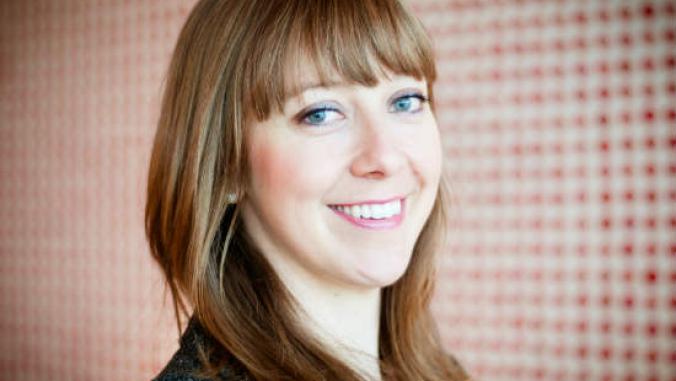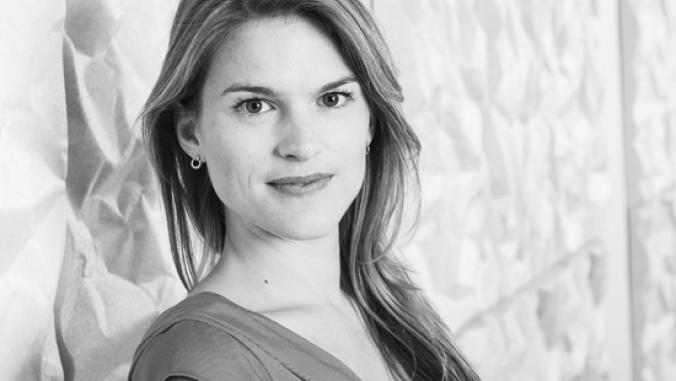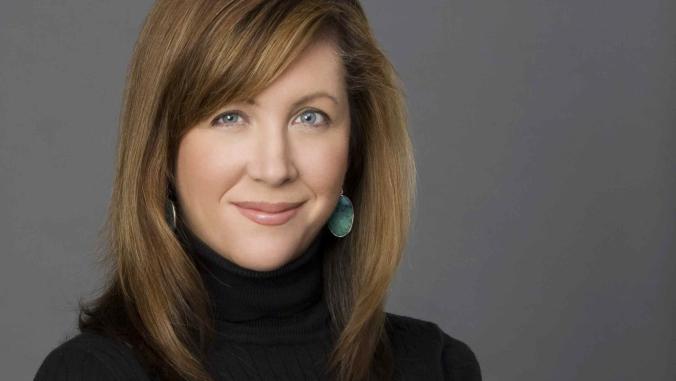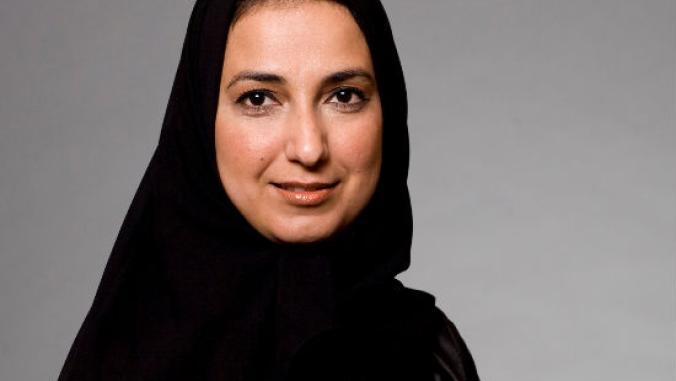
How She Leads is a regular feature on GreenBiz spotlighting the career paths of women who have moved into influential roles in sustainable business. In this edition, Maya Albanese interviews Sue Garnett, the Director of Sustainable Coffee Business and Senior Coffee Trader at Ecom Agroindustrial Corporation. Ecom is a global commodity trading and processing company specializing in coffee, cotton and cocoa. Garnett is responsible for developing and implementing Ecom’s sustainability strategy around coffee, positively affecting every level of its supply chain, from farmer to roaster to coffee mug. She has extensive knowledge of the long-term supply, demand, and risks associated with coffee, the second-most traded commodity in the world.
With Garnett’s leadership, Ecom brings coffee consumers and farmers closer together by promoting a more sustainable way of coffee production. The company’s process also allows for increased traceability and transparency. Ecom estimates that more than 15 percent of the coffee it exports has been verified as sustainably produced. Ecom Coffee Group now has farmer training and development programs in countries located in every region of its each origin it has export operations such as Brazil, Nicaragua, Costa Rica, Honduras, Guatemala, El Salvador, Mexico, Colombia, Peru, Uganda, Kenya, Tanzania, Papua New Guinea, India, Indonesia and Vietnam. Recently, Ecom created its Sustainable Management Services to develop a company-wide, coordinated approach and platform for inter-company exchange around its sustainable development programs.
In this interview, Garnett shares the personal and professional journey that brought her to the sustainable coffee industry.
Maya Albanese: Can you explain how you achieved your current role?
Sue Garnett: I joined Ecom in the late 1990s after working at Cargill. My job was to help Ecom establish its European sales office when the market price of coffee was at an all-time high. By 2002, the price had fallen to an all-time low. Many coffee roaster clients were concerned about the future supply and quality of coffee after several farms abandoned the industry during the years where prices were below the cost of production.
Since Ecom has built its business on close relationships with farmers, we’re in a good position to provide solutions to both farmers and roasters. In 2003, we started to put more structure to this, and I became the Director of Sustainable Coffee.
In this position I also challenged roasters to engage in addressing the problems that the coffee industry faced. Two of our clients at the time, Starbucks and Nespresso, stood out as businesses that not only recognized the challenges caused by extremely low prices in the market, but were prepared to invest in building up supply chains to ensure that the farmer survived and continued to produce the best quality coffee possible.
MA: Why are you passionate about working for social and environmental responsibility?
SG: Before joining Ecom, I ran the East Africa coffee trading desk at Cargill and was aware of the inequality of living standards and opportunities for workers in developing countries. I was also troubled by the lack of transparency -- particularly in regards to cash flow -- within the coffee supply chain. It pleasing to now be part of a process that is trying to redress the imbalance of the opportunities by ensuring that producers share the profits.
MA: Could you explain the major functions of Ecom?
SG: Ecom is one of the world’s top three merchants in coffee and one of the top five merchants in cotton and cocoa. It’s also one of the largest coffee millers in the world. With our heavy investment in infrastructure in countries producing these products, it is extremely important that it is economically viable for the farmers to continue growing these soft commodities.
Photo of Sue Garnett courtesy of Sue Garnett
MA: Why coffee specifically? For your life’s work, and for Ecom’s sustainability agenda?
SG: I joined the graduate recruitment scheme at Cargill and was assigned to their newly acquired coffee division. I have never considered leaving the coffee business since. No year is the same as the next. Demand for coffee continues to grow from one to two percent every year. Supply varies dramatically according to natural crop cycles and unforeseen failures, and roasters are always reworking their blends.
With the low prices of the early 2000s, the industry understood the need to pay attention to the plight of the coffee farmer and create standards that could help farmers increase their income. Several NGOs became more visible and vocal about coffee including Rainforest Alliance, Fair Trade and UTZ Certified. Each addressed social, environmental and economic issues to varying degrees. The implementation of these NGOs’ sustainability standards became crucial for roasters who were looking for independent verification to show that they were doing something about the issues.
MA: Ecom’s home page lists “sustainability” as one of its four top navigation links. Has it always been a top priority at the company?
SG: As a privately-owned company, Ecom has always been free to choose its own direction. Thus, the fact that Ecom has chosen to pursue sustainability is a reflection of our DNA rather than result of outside pressure. We do what we feel is the right thing to do. Indeed, when we created my title in 2003, it was to give external visibility to the work we were already doing internally.
MA: Who else is on the sustainability team?
SG: In 2003, we had three staff. Now we have Sustainable Management Services (SMS) offices in each country where we operate an export company in. These SMS offices focus on farmers, providing services such as technical assistance for enhanced crop management. They also help with certification, microfinancing and climate change adaptation. Sustainability is at the top of each manager’s agenda, and we have always received support from the board for our sustainability agenda.
MA: What is a project that you are proud of accomplishing at Ecom?
SG: There is much to be proud of in the work we have achieved to date, but what I am most proud of is that what seemed like a bit of a “girl’s job” has positively revolutionized the way my male colleagues view their social and environmental responsibilities and manage their local businesses.
For example, in 2004, I was asked by our country manager in Honduras why he should care about sustainability. After our meeting, he started working with farmers on sustainable farming practices. Since then, we have worked with 250 medium-sized farmers there. Today, they produce 300,000 bags of certified coffee a year.
Their yields have increased and the farmers have reduced their costs by 40 percent due to a better use of fertilizer. There are similar stories in all of the countries we work with, but this was a pivotal moment for me.
MA: What kinds of projects are you working on that are geared toward women?
SG: We spend a lot of time working with women and are always trying to find ways to promote female farmers. We’ve found that when more women are collecting money for the beans at market, the families in coffee communities are better off. We’ve just started a two-year project with Nestle in Kenya with a specific focus on doubling yields and empowering women farmers within the coffee supply chain.
As we train groups of farmers there to adhere to the Rainforest Alliance and 4C verification standards, we are also ensuring that at least 20 percent of the farmers that come forward to become trainers are women.
We also work to promote women leaders within the coffee cooperatives and give them a voice to teach the rest of their communities about the ways to implement sustainable agricultural practices.
MA: What kinds of external partners do you work with? How do these relationships help advance sustainable development?
SG: Certification NGOs such as the Rainforest Alliance, UTZ, and 4C, programs such Starbucks Cafe Practices and Nespresso’s AAA, and donor partners such as International Finance Corporation, Solidaridad, DE Foundation, GIZ, HIVOS, DEG and research companies such as Cirad. These are all important relationships.
To obtain certification under Rainforest Alliance, farms must meet a set of environmental and social standards including agrochemical reduction, ecosystem conservation, and worker health and safety. They also verify carbon offset projects to standards that address greenhouse gas sequestration, biodiversity conservation and sustainable livelihoods. Achieving Rainforest Alliance’s standards has significant positive impact on farmers both in terms of increased productivity and reduced costs.
MA: Where do you think “sustainability” as a profession can go from here?
SG: I don’t believe that sustainability is a profession. It is just a label to describe the way in which a job is done. I am a coffee trader, and I trade in a socially, environmentally and economically responsible way. In the future, I believe that behaving in a non-sustainable manner will be a barrier to business. It is my hope that sustainable coffee will become the norm, and anything else will trade at a discount.
MA: What advice would you give other professionals aspiring to hold positions similar to yours?
SG: I would advise them to question traditional business methods. If they don’t feel right, they probably are not. Most importantly, work for a company where the management actively supports sustainable practices.
MA: What are challenges that you face at Ecom, and how will you overcome them?
SG: We face the challenge of meeting the demand for sustainable beans, which roasters have publicly stated they will need over the coming years. Access to funding or grants focused on working with farmers to become sustainable producers has also become harder to find.
Employing and retaining competent agronomists has become a challenge as the world competes for a select group of people whose skill sets have only been acquired in the past few years. To ensure we continue to have skilled staff, we recruit graduates of agronomy programs from local universities. We have 321 Agronomy staff - more than our total number of traders!
Despite challenges, we are committed to the process as consumers continue to demand more sustainable coffee.
MA: What sustainability challenges remain for the coffee industry as whole?
SG: A debate ensues about the value of coffee. In the past, there was an industry belief that as long as the farmer was covering his or her cost of production, then all was well in the world. Ecom has moved on from this view. We do not see why a farmer’s child should not be able to attain a standard of living higher than subsistence. I was traveling recently in Vietnam on a collaborative coffee sustainability project, and admired a farmer’s four-wheel drive car which was carefully protected below a plastic tarp. Some people may have balked at a farmer’s nice new car -- but if we want these farmers’ products - and at a high quality at that - then we must seek to offer them more than subsistence.





